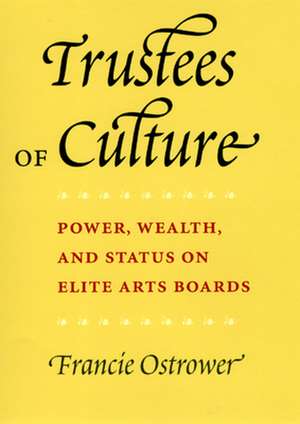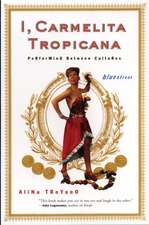Trustees of Culture: Power, Wealth, and Status on Elite Arts Boards
Autor Francie Ostroweren Limba Engleză Paperback – 15 mai 2004
Cultural trusteeship is a subject that fascinates those who wonder about the relationship between power and culture. What compels the wealthy to serve on the boards of fine arts institutions? How do they exercise their influence as trustees, and how does this affect the way arts institutions operate? To find out, Francie Ostrower conducted candid personal interviews with 76 trustees drawn from two opera companies and two art museums in the United States.
Her new study demonstrates that members of elite arts boards walk a fine line between maintaining their status and serving the needs of the large-scale organizations they oversee. As class members whose status depends in part on the prestige of the boards on which they serve, trustees seek to perpetuate arts boards as exclusive elite enclaves. But in response to pressures to increase and diversify the audiences for arts institutions, elite board members act in a surprisingly open manner in terms of organizational accessibility and operations.
Written with clarity and grace, Trustees of Culture will contribute significantly to our understanding of organizational governance; the politics of fundraising; elite arts participation and philanthropy; as well as the consequences of wider social policies that continue to emphasize private financial support. Ostrower's study will prove to be indispensable reading for not just sociologists of culture, but anyone interested in how the arts are financially and institutionally supported.
Her new study demonstrates that members of elite arts boards walk a fine line between maintaining their status and serving the needs of the large-scale organizations they oversee. As class members whose status depends in part on the prestige of the boards on which they serve, trustees seek to perpetuate arts boards as exclusive elite enclaves. But in response to pressures to increase and diversify the audiences for arts institutions, elite board members act in a surprisingly open manner in terms of organizational accessibility and operations.
Written with clarity and grace, Trustees of Culture will contribute significantly to our understanding of organizational governance; the politics of fundraising; elite arts participation and philanthropy; as well as the consequences of wider social policies that continue to emphasize private financial support. Ostrower's study will prove to be indispensable reading for not just sociologists of culture, but anyone interested in how the arts are financially and institutionally supported.
Preț: 214.12 lei
Nou
Puncte Express: 321
Preț estimativ în valută:
40.97€ • 44.68$ • 34.55£
40.97€ • 44.68$ • 34.55£
Carte tipărită la comandă
Livrare economică 24 aprilie-08 mai
Preluare comenzi: 021 569.72.76
Specificații
ISBN-13: 9780226639673
ISBN-10: 0226639673
Pagini: 158
Dimensiuni: 133 x 203 x 15 mm
Greutate: 0.18 kg
Ediția:1
Editura: University of Chicago Press
Colecția University of Chicago Press
ISBN-10: 0226639673
Pagini: 158
Dimensiuni: 133 x 203 x 15 mm
Greutate: 0.18 kg
Ediția:1
Editura: University of Chicago Press
Colecția University of Chicago Press
Notă biografică
Francie Ostrower is a senior research associate in the Center on Nonprofits and Philanthropy at the Urban Institute, Washington, D.C. She is the author of Why the Wealthy Give: The Culture of Elite Philanthropy and coauthor of Race, Ethnicity, and Participation in the Arts.
Cuprins
Acknowledgments
Introduction
1. Elite Trustees: A Profile
2. A Dual Approach: Openness and Exclusivity on the Elite Board
3. Diversity and the Elite Board: Race, Ethnicity, and Class
4. Fundraising and the Role of the Elite Board
5. Status and Governance: A Delicate Balance
6. Conclusion
Notes
Bibliography
Index
Introduction
1. Elite Trustees: A Profile
2. A Dual Approach: Openness and Exclusivity on the Elite Board
3. Diversity and the Elite Board: Race, Ethnicity, and Class
4. Fundraising and the Role of the Elite Board
5. Status and Governance: A Delicate Balance
6. Conclusion
Notes
Bibliography
Index











